An LGBTQ2+ National Monument will soon be built in the National Capital Region that will memorialize discrimination against LGBTQ2+ people in Canada, including those impacted by the LGBT Purge. The monument is directed by a court order that was issued in 2018 as part of the class action lawsuit brought against the Government of Canada by survivors of the LGBT Purge.
Between September and December 2019, a vision for the LGBTQ2+ National Monument emerged through a dynamic and inclusive consultation process. The vision will be an important part of the request for qualifications process that the Department of Canadian Heritage will launch in the spring of 2020. This process is meant to galvanize and inspire design proposals, and to generate a monument that is both meaningful to the LGBTQ2+ community and leaves a lasting impact on the hearts and minds of all who visit it.
Participation of LGBT Purge survivors and Canada’s diverse LGBTQ2+ communities was fundamental to the creation of the monument’s vision and related educational objectives. Our process, outlined here, engaged LGBTQ2+ people and communities as well as allies from across the country – people of all ages and diverse identities who contributed expertise in history, activism, community organizing and advocacy, law, politics, design, arts, writing and teaching. It also heard from 2-Spirit Indigenous, First Nation, Inuit and Métis individuals through a parallel Indigenous Circle and from local Algonquin communities, Kitigan Zibi and Pikwàkanagàn. Our goal was to invite discussion, awareness and deliberation.
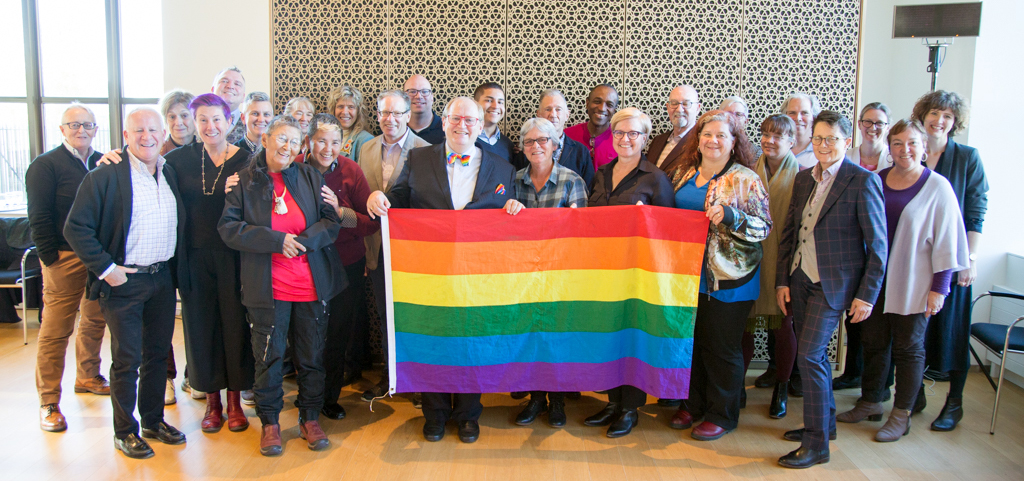
In addition to producing a monument vision, the process helped select a monument site from a range of options presented by the National Capital Commission. The consultation process also identified educational objectives and formats for an exhibition about the LGBT Purge being curated and hosted by the Canadian Museum for Human Rights in Winnipeg.
Ultimately, we engaged over 150 people on the vision, over 35 people on site consultation and over 100 people on the content and format for the museum exhibition. Stakeholders were selected for each phase to ensure the process and its participants were representative of our vast country and our diverse communities. These participants and the broader public will be asked by Canadian Heritage to provide feedback on the design alternatives before a final monument design is selected by a jury in the future.
The multi-phase engagement process included: a Monument Advisory Committee; an Indigenous Circle; small discussion groups; a national e-survey; commissioned briefing documents from critical voices; institutional outreach; and meetings with Algonquin leaders. Summaries of these phases and lists and biographies of select participants are provided below.
You can learn more about the Monument project via our FAQs and Process Overview. And you can read the final Monument Vision HERE.
Monument Advisory Committee
This Committee of eighteen LGBT Purge survivors, community leaders, advocates, historians and design professionals joined the LGBT Purge Fund Board of Directors to develop a framework for the monument’s vision, consider potential monument sites and play an on-going role in the project and vision development.
The group met in Ottawa on October 3rd and 4th, 2019, to lay the foundation for the first draft vision. The two-day event, held in French and English, began with a bus and walking tour of existing monuments and potential sites. The Committee then met at the Global Centre for Pluralism for a full-day workshop. The Committee learned from a panel of design experts and a representative from Canadian Heritage about dynamic monuments and design briefs and participated in a review of historic precedents and case studies of LGBTQ2+ monuments and memorials. Members shared their thoughts on guiding design principles and priorities, learning objectives and critical historic context to inspire the first draft vision.
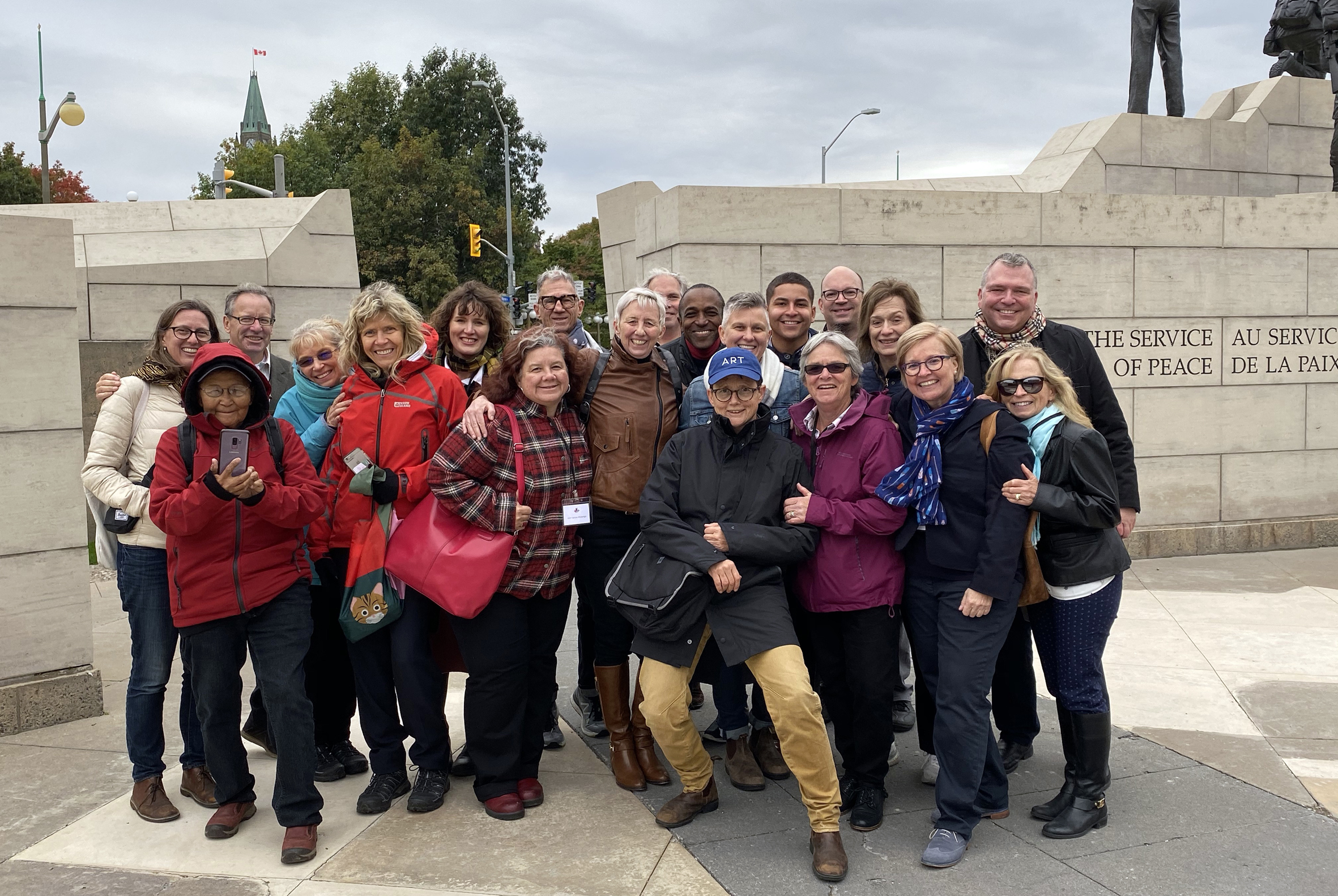
Indigenous Circle
On October 23rd, 2019, a full-day Indigenous Workshop and Circle was convened at the Canadian Museum of History in Gatineau. The event created a space for those who identify as 2-Spirit and LGBTQ+ First Nations, Inuit and Métis to reflect on the emerging vision and consider the merits of three potential sites. The eleven participants hail from the Ottawa region, Northern and Southern Ontario, Nunavut, Labrador, Quebec, the East Coast and the Prairies.
The Workshop and Circle were preceded with a screening of the documentary The Fruit Machine at the Andaz Hotel. On October 23rd, participants took a tour of existing monuments and potential monument locations. They then discussed Indigenous approaches to sites and memorialization during two Talking Circles.
Participants stressed the importance of the land, the river, storytelling and building a space of inclusion. They expressed hope that the monument will be a sacred and natural gathering space and a place to heal for all. Discussions resulted in the addition of an Indigeneity principle to the vision. Dialogue with this group will be on-going as we look to an opening ceremony in the future.
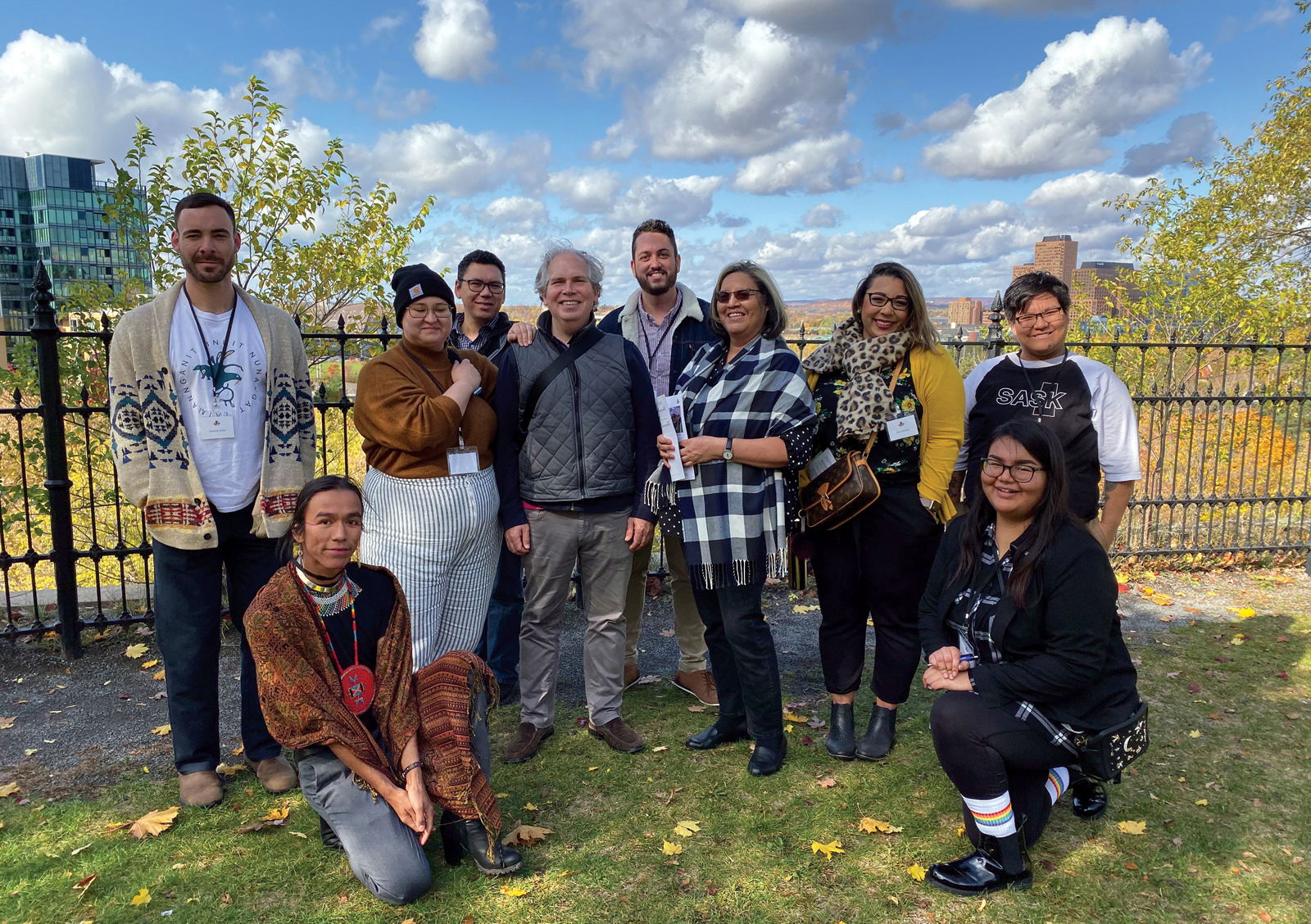
Small Discussion Groups
Between November 12 and 15, 2019, nine small discussion group calls were held with key stakeholders from the LGBTQ2+ community. These calls gathered feedback on the developing monument vision and collected thoughts on the educational programming associated with the monument and the exhibition at the Canadian Museum of Human Rights. The calls, held in English and French, ultimately engaged 30 people.
Participants were asked if the vision resonated with them and if anything was missing or needed. The vision was refined in response to suggestions for shifts in foci and additions, including greater emphasis on histories of resistance and the need for more inclusive language.
When asked about educational programming topics, participants shared an overwhelming interest in using personal stories, artifacts, recordings and photographs to communicate the history of the LGBT Purge and wider histories of discrimination. They expressed interest in communicating the colonial roots of discrimination, the Purge’s geo-political context and the diversity of the LGBTQ2+ community, among others. These topics were described as best conveyed through immersive experiences, including audio-visual, live aspects, digital components and a travelling exhibition. Participants shared an interest in inspiring visitors to connect the dots between the past and present, and to resolve to be vigilant about human rights for all.
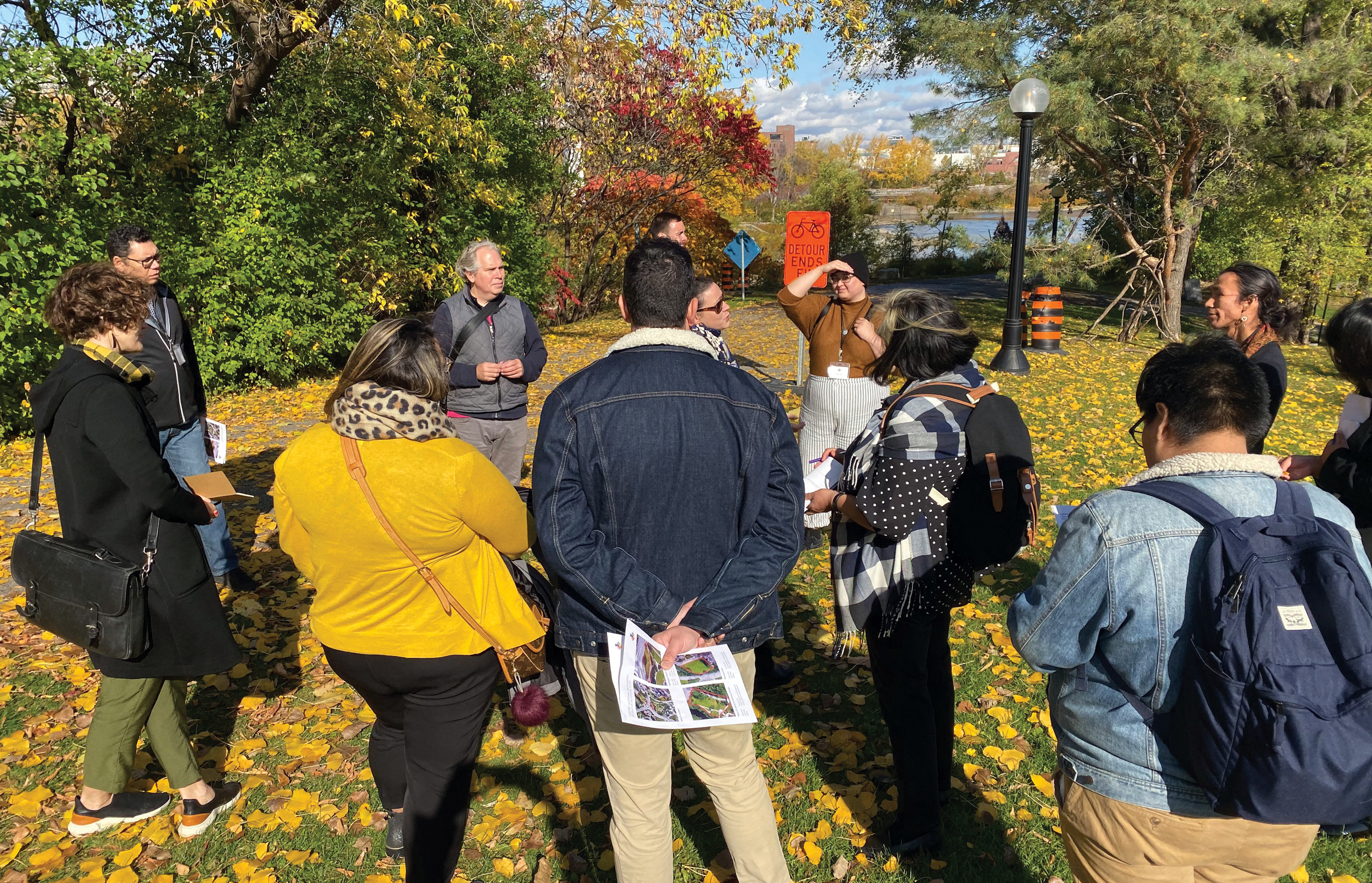
National E-survey
Between November 29 and December 8, 2019, feedback was collected from the LGBTQ2+ community via a national e-survey. It had two objectives: to test how the developing vision resonated with a wider audience and to gather feedback on the educational programming associated with the monument and the exhibition at the Canadian Museum for Human Rights. The survey, posted in English and French, received a total of 74 survey responses. Efforts were made to specifically reach out to survivors of the LGBT Purge and encourage them to participate in this e-survey.
Of those who read the draft vision, 76% found that it resonated or resonated strongly. When asked about educational programming, respondents showed interest in seeing a wide range of topics addressed: from the histories of LGBTQ2+ resistance; to the personal stories of Purge survivors; to legal histories and geopolitical issues; to resources for addressing on-going challenges. They also contributed additional ideas for educational topics, including health issues, challenges facing seniors and youth and the contributions of LGBTQ2+ pioneers. Respondents were open to a diverse range of ways to learn about the LGBT Purge and highlighted a wide range of contemporary issues facing the community.
Briefing Documents
To ensure this process was broad and inclusive, we commissioned briefing documents from critical voices. These diverse perspectives, provided by Brenda Cossman, Gary Kinsman and Albert McLeod, open up debates around the LGBT Purge, LGBTQ2+ history and its monumentalization. They were shared with all participants and are available for download here : Gary Kinsman, Brenda Cossman and Albert McLeod.
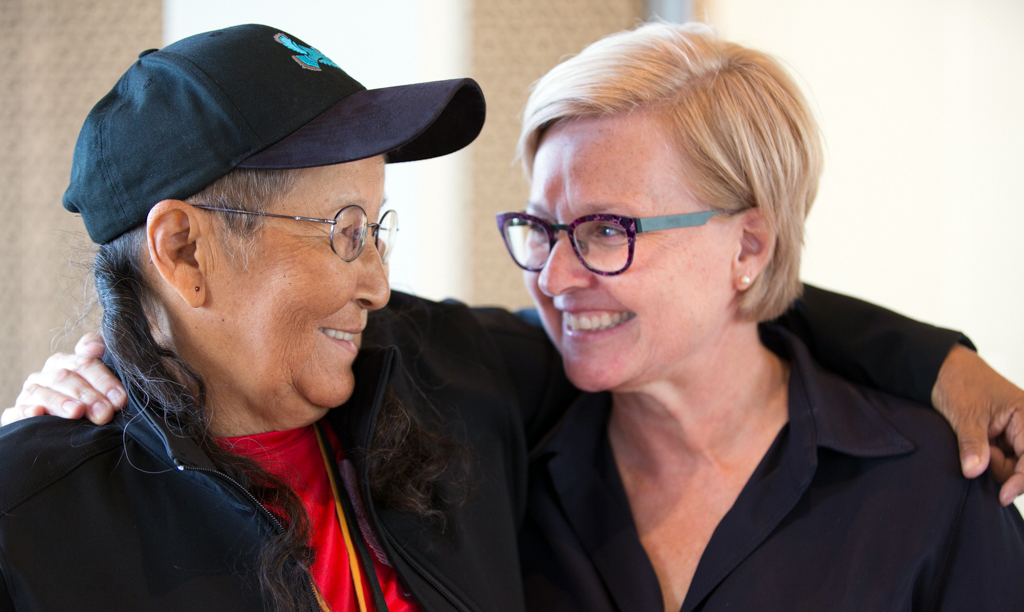
Institutional Outreach
In September 2019, DWD shared process and project details with senior managers from a range of professional architectural, landscape and planning bodies and government. This included representatives from: the Canadian Institute of Planners; the Royal Architectural Institute of Canada; the Canadian Society of Landscape Architects, the Ontario Association of Architects; the City of Ottawa; the LGBTQ2 Secretariat; and Heritage Ottawa. Many subsequently shared details of the monument project with their members.
Meetings with Algonquin Leaders
The LGBT Purge Fund Board acknowledges and respects that the land proposed by the National Capital Commission for the monument is unceded Algonquin territory. We worked to establish early, meaningful and ongoing input from the local Algonquin communities. Efforts were also made to include the local Algonquin communities in the Indigenous Circle via a letter of information and invitation created for Kitigan Zibi and Pikwàkanagàn community e-newsletters.
In December 2019, the National Capital Commission arranged meetings with Algonquin leadership, and LGBT Purge Fund Board members were honoured to sit down with Councillors to explain the history of the monument project and communicate its educational and design objectives. This engagement has always been envisioned as a long-term process. Engagement, outreach and dialogue is on-going as part of the NCC implementation plans for the project. In addition, the LGBT Purge Fund Board will continue to inform, engage and update the Kitigan Zibi and Pikwàkanagàn communities as needed.
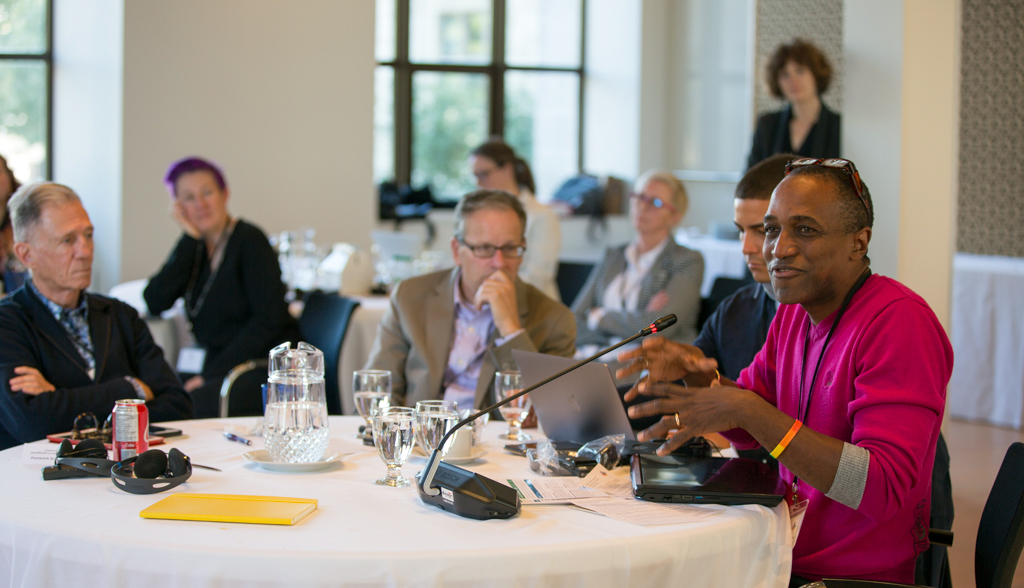
Select process participants
In addition to the LGBT Purge Fund Board members, and the LGBT Purge Fund Executive Director, Michelle Douglas, our participants included:
MONUMENT ADVISORY COMMITTEE AND INDIGENOUS CIRCLE MEMBERS:
Mark Berlin is a Professor of Practice at McGill University’s Institute for the Study of International Development. He served on the board of the Canadian Bar Association and has chaired its Equality Committee, and its Sexual Orientation and Gender Identity Forum. Mark currently serves on the Board of Trustees of the Canadian Museum for Human Rights.
Mark Bonham is a Senior Fellow of Massey College at the University of Toronto. A philanthropist, Mark has endowed the Mark S. Bonham Centre for Sexual Diversity Studies at the University of Toronto and co-chaired the capital campaign to create Egale Centre, Toronto’s first LGBTQ homeless youth shelter. Mark is a co-founder of the online biographical encyclopedia QueerBio.com.
Ma-Nee Chacaby is a Two-Spirit Ojibwa-Cree Elder. She was raised by her Cree grandmother in a remote Ojibwa community near Lake Nipigon, Ontario. Her autobiography, A Two-Spirit Journey, is an invaluable and unique record of surviving hardship and isolation combined with compassion, resilience and an extraordinary capacity to find joy and belonging throughout her life.
Elise Chenier is a professor at Simon Fraser University where she teaches courses in the history of sexuality, oral history, and Canadian social history. She is the Director of the Archive of Lesbian Oral Testimony and an associate faculty member of the Gender, Sexuality and Women’s Studies Department.
Patrick Desmarais is the president of Fondation Émergence, a non-profit organization dedicated to fighting homophobia and promoting equality in the law and in society. With a background in law and the financial sector, Patrick has also volunteered with several LGBT organizations including the IDEO Network at the National Bank of Canada and the Equality Committee of the Canadian Bar Association.
Justin Ford was born and raised in rural Manitoba. With a passion for arts and culture, Justin spent almost a decade working as the Programming Director for the Nunavut Arts and Crafts Association. An artist in his own right, he has produced and directed feature and short films. Justin is currently the CEO of CatalystsX, an organization that promotes and supports young social entrepreneurs and changemakers.
Lynne Gouliquer is an Associate Professor of Sociology at Laurentian University and a Purge survivor. Her academic research has focused on military and para-military institutions and marginalization. Her PhD research investigated women’s career success and integration in the Canadian military.
Morgan Holmes is a Professor of Sociology at Wilfrid Laurier University. She is an intersex activist and writer. Her research looks at the anthropology of medicine and the ethics of consent to elective surgery for minors. Her research focus has been the medical conceptual framework of ‘intersex’ and she has published extensively on the effect of diagnosis and treatment on infants and children.
Taylor Jolin is an Ojibwe multidisciplinary artist from Sault Ste. Marie, ON. Taylor received her BFA from Algoma University in 2016 and has exhibited extensively locally and across Ontario. She is currently on the board of directors at 180 Projects, a volunteer-run gallery and experimental project space, and is a member of the Indigenous Women’s Anti-Violence Taskforce and the Northern Indigenous Artist Alliance
RJ Jones is nakawè nêhiyaw (Saulteaux –Cree), originally from Regina, Saskatchewan (Treaty no. 1 & 4) and is currently living on Algonquin Territory in Ottawa. They are a Two Spirit, Non-Binary and Queer multimedia artist, educator and full spectrum doula in decolonizing our approach to gender, sexuality and sexual health as well as anti-oppression, accessibility, art in activism.
Kevin Kablutsiak is Inuk from Arviat, Nunavut where he grew up. He has spent most of his career in broadcasting and communications and is the former host of Qulliq on CBC Radio North. He now lives in Ottawa with his husband and daughter.
Helen Kennedy is the Executive Director of Egale Canada. She was a founding member of Canadians for Equal Marriage and is out-going Co-Secretary General of the International Gay, Lesbian, Trans and Intersex Association. In addition to her 22 years of political experience, Helen’s work includes the Climate Survey on Homophobia and Transphobia in Canadian Schools, consulting with senior Pentagon officials on the US military’s “Don’t Ask, Don’t Tell” policy, and consulting with the Vatican regarding decriminalization of LGBTI people globally.
Marie-Laure LeClercq is an intellectual property lawyer with De Grandpré Chait in Montreal. She is a champion for the transgender community and spearheaded the creation of the Sexual Orientation and Gender Identity Conference for the Quebec Branch of the Canadian Bar Association (CBA). She has advocated to include gender identity and gender expression as prohibited grounds of discrimination in the Canadian Human Rights Act and serves as a member of the CBA Board of Directors.
Gina Metallic is a Mi’gmaq Two-Spirit social justice warrior from the Listuguj Mi’gmaq First Nation in Quebec. She is a granddaughter, daughter, sister, auntie, partner and step-parent. Gina holds a graduate degree: a Masters of Social Work in Community & International Development from McGill. She currently lives in Ottawa and is a Registered Social Worker through the Ontario College of Social Workers and Social Service Workers.
Anij Morton is a two-spirit queer Anishnabe-kwe from Kabapikotawangag near Kenora. She is proud of the communities she is a part of, and she is learning to serve them better as a student of the Indigenous Community Support Worker program at Willis College in Ottawa, where she lives with her 13-year-old daughter.
Barry Padolsky is an Ottawa based architect, heritage and urban design consultant. He was the professional advisor and project manager of the Lord Stanley’s Gift Monument project.
Carmen Poulin is a Professor of Psychology and Gender & Women’s Studies at the University of New Brunswick. Her research interests focus on the social organisation of the everyday life of women and marginalised individuals in particular institutions. Through her research, teaching, and advocacy, Carmen has dedicated her career to the advancement of women and other marginalized groups.
Ron Rosenes is a long-time community volunteer, HIV activist and social justice advocate. He served as chair of the AIDS Committee of Toronto in the 1990s, and as a founding board member of the Sherbourne Health Centre. He is currently chair of the HIV Legal Network. Ron has an honorary doctorate from Carleton University and was honoured with the Order of Canada in 2015.
Davy Sabourin is the Chair of Capital Pride, the Pride organization of Canada’s National Capital Region (Ottawa-Gatineau). He also serves on the Board of Directors of InterPride, where he represents Canadian Pride organizations on an international level. Davy holds degrees in Police Foundations, Mental Health and Addictions, as well as a Bachelor of Social Sciences in the fields of in Conflict Studies and Human Rights, and Social Work.
Mary Woo Sims is the former Chief Human Rights Commissioner for BC who was among the first to call for human rights laws to include trans people. A lifelong social justice advocate, Mary Woo represented the Canadian Association of Statutory Human Rights Agencies at the 2001 UN World Conference Against Racism, Xenophobia and Related Intolerance and received an award from the International Association of Official Human Rights Agencies. She is also an experienced writer and opinion columnist and ran for politics at the local and federal levels.
El Sturko is the Media Relations Officer for the RCMP in Surrey, BC. She joined the RCMP in 2009 following a long-standing family tradition. She is the great-niece of Sergeant Dave Van Norman, a Mountie who was forced to resign from the RCMP in 1964 as part of the Purge. She is passionate about sharing her family’s story and offers a unique perspective on being an LGBTQ2+ person in the RCMP.
Leigh Thomas (piyesiw okanaw-eyihcikew) is an internationally recognized Two-Spirit Advocate and highly decorated 23- year-old Trans-Non-Binary Cree-Métis Knowledge Keeper, Regional and Urban Planning Student, Primary Naval Reservist, and multimedia artist from Pelican Lake First Nation, SK. A 2015 Governor General Saskatchewan Service Pin Recipient, 2018 Future 40 Saskatchewan Recipient, and 2019 Merit of Excellence award from the Canadian Institute of Planning.
Maurice Tomlinson has been a leading gay rights and HIV activist in the Caribbean for over 20 years. He teaches Canadian Human Rights and other law courses at the University of Ontario Institute of Technology in Oshawa and is a Senior Policy Analyst for the Canadian HIV/AIDS Legal Network where he focuses on challenging homophobia in the Caribbean.
Kim Vance-Mubanga is the founder of ARC International, which works to advance LGBTQ2+ issues within the UN human rights system. She is a former president of Egale Canada and a seasoned activist within LGBTQ2+ communities at the international, national and local levels.
Kristopher Wells is a faculty member at MacEwan University and the Canada Research Chair for Public Understanding of Sexual and Gender Minority Youth. He specializes in sexual and gender minority youth, education, health, sport and culture and has served as an expert scientific consultant to a range of institutional and governmental organizations across Canada.
Mitchell White is a beneficiary of the Labrador Inuit Land Claims Agreement who spent his youth as a reporter for the OKalaKatiget Society and volunteering in his community of Nain, including serving as the Nunatsiavut Transitional Government’s Youth Representative. While completing university in Ottawa, he worked part-time as the Editor of Inuktitut Magazine, produced and published by Inuit Tapiriit Kanatami, before joining the Liberal Research Bureau as their Special Assistant with Indigenous Outreach in 2017. A visit to Antarctica in 2003 to witness the effects of climate change first-hand and a summer spent as a zodiac driver onboard an expedition ship in Canada’s Arctic in 2008 have taken him to both the Arctic and Antarctic circles, and his work with the Inuit Circumpolar Council has created bonds with Inuit from across Inuit Nunaat.
SMALL GROUP DISCUSSION PARTICIPANTS:
- Barry Adam
- Meredith Batt
- Betty Baxter
- Aaron Betsky
- Rene Cormier
- Murray Corren
- Cheri DiNovo
- Diane Doiron
- Dusty Green
- Brent Hawkes
- Ed Jackson
- Kavita Joshi
- Gary Kinsman
- Gary Lacasse
- Yves Lafontaine
- Andrea Love
- Hon Lu
- Ann-Marie MacDonald
- Don McLeod
- Robin Metcalfe
- Nancy Nicol
- Alisa Palmer
- Debra Parkes
- Darryl Perry
- Cathy Potts
- Jack Saddleback
- Paul Jonathan Saguil
- Jason Syvixay
- Syrus Ware
- Michael Went
